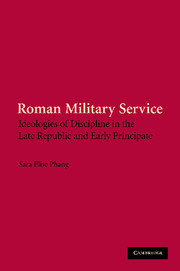Book contents
- Frontmatter
- Contents
- Preface and Acknowledgments
- Abbreviations
- General Introduction
- 1 Theorizing Disciplina: Social Conflict, Legitimation, and Power
- 2 Combat Training and Discipline
- 3 Viri Militares: Habitus and Discipline
- 4 Disciplina and Punishment
- 5 Disciplining Wealth: The Ideologies of Stipendia and Donativa
- 6 Labor Militaris: Work as Discipline
- 7 Feasts of Mass Destruction: Disciplina and Austerity
- General Conclusion
- Bibliography
- Index
1 - Theorizing Disciplina: Social Conflict, Legitimation, and Power
Published online by Cambridge University Press: 27 July 2009
- Frontmatter
- Contents
- Preface and Acknowledgments
- Abbreviations
- General Introduction
- 1 Theorizing Disciplina: Social Conflict, Legitimation, and Power
- 2 Combat Training and Discipline
- 3 Viri Militares: Habitus and Discipline
- 4 Disciplina and Punishment
- 5 Disciplining Wealth: The Ideologies of Stipendia and Donativa
- 6 Labor Militaris: Work as Discipline
- 7 Feasts of Mass Destruction: Disciplina and Austerity
- General Conclusion
- Bibliography
- Index
Summary
INTRODUCTION
Social conflict, as distinguished from overt struggle or violence, is a prominent theme in Roman military discipline. An account of social conflict in the Roman military should explain why the soldiers' mutinies were relatively infrequent. The usual explanations are political and material: soldiers' loyalty was secured by their annual oaths of allegiance to the emperor; by reverence for the emperor, fostered by the imperial cult; and by pay, benefits, and imperial gifts of money and privileges. These methods suggest a patrimonial mode of authority, in which the emperor was a personal benefactor of his soldiers. Little attention has been paid to a countervailing ideology of disciplina militaris, which commanders (both aristocrats and emperors) imposed to legitimate their commands; disciplina repressed unrestricted patronage of the army. However, the commander who imposed disciplina also needed to persuade the soldiers. This chapter examines the applicability to the Roman army of Weberian sociology, Marxist theory, and Pierre Bourdieu's theories of habitus and social and cultural reproduction. The social status of Roman soldiers is debated by modern scholars. Soldiers occupied an intermediate, subelite position in the Roman social hierarchy, in which their status was highly relative; this occupational status was reinforced by separation from low-status groups and activities.
SOCIAL HIERARCHY AND POTENTIAL CONFLICT
The Marxist definition of “class” is insufficient to describe social differentiation in the Greek and Roman world.
- Type
- Chapter
- Information
- Roman Military ServiceIdeologies of Discipline in the Late Republic and Early Principate, pp. 13 - 36Publisher: Cambridge University PressPrint publication year: 2008

